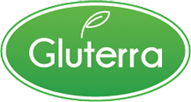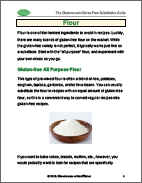Submitted by Andrea on August 7, 2013
 Celiac Disease, gluten intolerance and wheat allergies have some similarities and differences. The three are treated in the same way, which is an elimination of a certain food or foods from the diet. However, there are many differences between these three medical conditions. For one, Celiac Disease is an autoimmune disease, while the other gluten intolerance and allergies just involve the immune system. Celiac Disease and gluten intolerance can have similar, yet various symptoms over time; however, an allergy can have symptoms that can come on suddenly. If you feel as if you may have one of these medical conditions, read to find out more about the symptoms, medication and treatment of each.
Celiac Disease, gluten intolerance and wheat allergies have some similarities and differences. The three are treated in the same way, which is an elimination of a certain food or foods from the diet. However, there are many differences between these three medical conditions. For one, Celiac Disease is an autoimmune disease, while the other gluten intolerance and allergies just involve the immune system. Celiac Disease and gluten intolerance can have similar, yet various symptoms over time; however, an allergy can have symptoms that can come on suddenly. If you feel as if you may have one of these medical conditions, read to find out more about the symptoms, medication and treatment of each.
What are the Symptoms, Medication and Treatment of Celiac Disease?
 Celiac Disease is an autoimmune disease in which the proteins in wheat, rye, barley create an inflammatory process in the small intestine consequently destroying the the villi, or hair-like projections, designed to absorb nutrients from the food into the body. Imagine the villi acting as little fingers reaching out to grab essential nutrients to absorb into the bloodstream. Since Celiac is an autoimmune disease, the body mistakingly identifies cells as foreign invaders and attacks them as they would a bacteria or virus. In the case of Celiac Disease, when a person ingests gluten (in the form of wheat, barley or rye), the body responds by damaging those villi, making the villi unable to do their job. This leads to many problems, malnourishment being one of the biggest. If gluten is continually ingested by a person with Celiac Disease, villous atrophy can occur which is when the villi can actually erode away or flatten.
Celiac Disease is an autoimmune disease in which the proteins in wheat, rye, barley create an inflammatory process in the small intestine consequently destroying the the villi, or hair-like projections, designed to absorb nutrients from the food into the body. Imagine the villi acting as little fingers reaching out to grab essential nutrients to absorb into the bloodstream. Since Celiac is an autoimmune disease, the body mistakingly identifies cells as foreign invaders and attacks them as they would a bacteria or virus. In the case of Celiac Disease, when a person ingests gluten (in the form of wheat, barley or rye), the body responds by damaging those villi, making the villi unable to do their job. This leads to many problems, malnourishment being one of the biggest. If gluten is continually ingested by a person with Celiac Disease, villous atrophy can occur which is when the villi can actually erode away or flatten.
There are many classic symptoms of Celiac Disease such as diarrhea, weight loss, malnutrition, and bloating. However, symptoms can vary with different age groups. It's also important to know that certain stressors or a traumatic event may bring the symptoms to the surface. According to WebMD, for children, it's more common to see:
-Growth problems like short stature
-Decreased appetite and a failure to gain weight
-Chronic diarrhea, or conversely
-Chronic constipation
-Vomiting
-Fatigue
-Irritability
-Neurological Disorders such as ADHD
For teenagers, it's common to see (in addition to classic symptoms):
-Delayed puberty
-Growth problems
-Fatigue
-Irritability
-Depressions
-An itchy skin rash
-Mouth sores
Adults may notice (in addition to the classic symptoms):
-Iron Deficiency or Anemia- due to malabsorption of iron in the small intestine
-Bone or joint pain
-Bone loss or osteoporosis- a result of lack of calcium. Some people have also had darkening or thinning of the enamel of the teeth as well.
-Arthritis
-Depression or anxiety
-Seizures
-Erratic menstrual periods, infertility and miscarriages
-Itchy skin rash
-Mouth sores
What Should You Do If You Are Having Symptoms?
There are actually some people who have Celiac Disease that don't have any symptoms. The terms "Silent" or "Latent Celiac Disease" have been used for these people as well. I didn't think I was having symptoms of Celiac Disease or any type of gluten intolerance/sensitivity at the time, but I knew that Celiac Disease is a hereditary disease. I saw what my father had gone through since being diagnosed with a severe form of Celiac, called Refractory Celiac Sprue, so I made an appointment with a Gastroenterologist to see if I could develop the disease. So, if you are having symptoms, or if you have a 1st or 2nd degree relative with the disease, a series of testing may be in the cards for you, as it was for me.
The first step is antibody testing. (And it's very important to remember not to be eating gluten free at this point. Celiac Disease cannot be diagnosed if a person is following a gluten free diet. The antibody tests have to "find" the gluten in your system so to speak.) I'm not a doctor, so I can't fully explain what the antibody tests are or how they work. However, after researching and going over some of my tests, diagnostic EMA tests (Anti-endomysial antibodies immunoglobin A (IgA) and immunoglobin G (IgG) as well as Anti-gliadin antibodies including IgA and IgG are done as well as the Anti-tissue translutaminase antibody (tTG) test. If the tTG and the EMA tests are positive, you move to the next step which is an endoscopy. (Some doctors will move to the next step anyway, even if a negative antibody test is received). An endoscopy is a procedure where a patient is sedated and a small tube (equipped with a light and a camera) is inserted down the throat, through the stomach and into the small intestine. What the doctor is looking at are the villi in the small intestine. These are the hair-like structures that are responsible for basically "collecting" vital nutrients during digestion as mentioned earlier. In a patient with Celiac Disease, these villi may be inflamed, or in person with Refractory Sprue, completely flattened. Biopsies are taken and sent to a laboratory. This procedure has always been called "the gold standard" for diagnosing Celiac Disease. At this point, your doctor can confirm your diagnosis. However, in my case, even with positive antibody tests, I had no evidence of villous atrophy so I moved on to the next stage of testing which was genetic testing. Celiac Disease is a genetic disease, as I have again stated earlier, so one can only develop the disease if you have one or both of the genes that predispose you to it, and those are called the DQ genes. More specifically, they are the HLA-DQ2 and HLA-DQ8 genes. I have both, so at this point I had my diagnosis.
While there may be over the counter medications to take for temporary relief of some gas pains, bloating, and nausea, there is no permanent treatment or cure for Celiac Disease. If you accidentally ingest gluten, it just takes some time for the body to "come back" from, what we call, "being glutened." Rest, relaxation, or anything that helps you decompress or detoxify can help you. The only "treatment" is elimination of gluten from the diet for life. It's very important to follow a strict gluten free diet. Straying from this diet can have severe consequences and complications. Besides being malnourished, you may have a severe loss of calcium which may lead to osteoporosis. Furthermore, people with Celiac Disease who do not strictly follow the gluten free diet have a greater chance of developing some forms of cancer including lymphomas.
What are the Symptoms, Medication and Treatment of Gluten Intolerance?
 Gluten intolerance involves the immune system but doesn't stimulate the body to produce antibodies. This also makes it an autoimmune condition. Gluten intolerance can have all of the symptoms of Celiac Disease, but the gluten will not affect the villi of the small intestine and will not affect the absorption of nutrients as it would with someone with Celiac Disease. People with Celiac Disease are gluten intolerant, but not everyone who is gluten intolerant has Celiac Disease.
Gluten intolerance involves the immune system but doesn't stimulate the body to produce antibodies. This also makes it an autoimmune condition. Gluten intolerance can have all of the symptoms of Celiac Disease, but the gluten will not affect the villi of the small intestine and will not affect the absorption of nutrients as it would with someone with Celiac Disease. People with Celiac Disease are gluten intolerant, but not everyone who is gluten intolerant has Celiac Disease.
There is no test for gluten intolerance. Antibody tests would come back negative and biopsies would most likely not show any damage to the intestines. According to the National Foundation for Celiac Awareness website, it is recommended that people who think they are gluten intolerant get tested for a wheat allergy and for Celiac Disease. If both are negative, your Gastroenterologist may recommend a gluten elimination diet to see if your symptoms improve.
Just like Celiac Disease, there are no medications to "cure" an intolerance. A person with gluten intolerance should follow a gluten free diet. Again, over the counter medications may ease gas, bloating, or nausea temporarily. You should still be monitored by a physician periodically.
What are the Symptoms, Medication and Treatment of Wheat Allergy?
![]() Food allergies seems to running rampant nowadays, and I'm actually a person with Celiac Disease and food allergies. They do go hand-in-hand. In my case, I cannot have any type of tree nut, coconut or peanut, and those allergies came on in adulthood. A food allergy (we'll take wheat as a specific example here) is when the immune system identifies the food (wheat) as a foreign invader and releases antibodies to fight it off. An allergy-causing food can trigger a multitude of symptoms. Some of the most common allergy symptoms are:
Food allergies seems to running rampant nowadays, and I'm actually a person with Celiac Disease and food allergies. They do go hand-in-hand. In my case, I cannot have any type of tree nut, coconut or peanut, and those allergies came on in adulthood. A food allergy (we'll take wheat as a specific example here) is when the immune system identifies the food (wheat) as a foreign invader and releases antibodies to fight it off. An allergy-causing food can trigger a multitude of symptoms. Some of the most common allergy symptoms are:
-Tingling in the mouth
-Hives, itchy skin
-Swelling of the lips, face, tongue, throat
-Wheezing, coughing, trouble breathing
-Abdominal pain, nausea, and vomiting
For some people, a food allergy can cause a severe or life-threatening reaction known as anaphylaxis. Anaphylaxis has the following symptoms:
-Constriction and tightening of the airways
-Swollen throat that makes it difficult to breathe
-Shock with a drop in blood pressure
-Rapid pulse
-Dizziness, lightheadedness or loss of consciousness
I have to say that I have headed in this horrible state before. It is extremely frightening. Sometimes an allergic reaction can be stopped by taking an antihistamine, such as Benadryl. I actually carry around a bottle of Children's Liquid Benadryl with me at all times. Since I'm a teacher, I'm lucky to have a School Nurse in the building with me everyday, and she suggested the liquid form since the liquid gets into your system faster than a pill or tablet would. Furthermore, some people use an inhaler with Albuterol or Levalbuterol to open up their airways if they are wheezing or coughing. This is, personally, my second line of defense after the Benadryl. Lastly, and for some people this is their first and only line of defense- an EpiPen, or Epinephrine Auto Injector, is used for emergency treatment of life-threatening allergic reactions. If an EpiPen is used, the patient must seek emergency medical treatment immediately. Allergic reactions can come in "waves" and monitoring by doctors is a must, especially after an EpiPen is used.
If a person is only allergic to wheat, he or she does not need to avoid other gluten containing foods. He or she should be monitored by a physician periodically.
In Conclusion
If you must follow a gluten free diet, whether you have Celiac Disease, a gluten intolerance or have an allergy, it's very important to read labels of all of the foods (and even some health and beauty items) that you buy. There are hidden sources of gluten in many products and it's imperative to know what those are. A few great resources for additional information are the Gluterra.com forums where people from various parts of the world share their experiences living gluten free: http://gluterra.com/forum, the National Foundation for Celiac Awareness: http://celiaccentral.org and The Celiac Disease Foundation: http://celiac.org.
- Login to post comments


 Click here to get a FREE GF Substitution Guide!
Click here to get a FREE GF Substitution Guide! 
 Sign-up to become a part of our gluten-free community. As a gift for being a free member, you can download our Gluten-Free Substitution Guide -- over 40 pages of great gluten-free substitutes. As a member, we will also send you our latest updates, recipes, and special offers. We'll try not to bug you and we won't share your info.
Sign-up to become a part of our gluten-free community. As a gift for being a free member, you can download our Gluten-Free Substitution Guide -- over 40 pages of great gluten-free substitutes. As a member, we will also send you our latest updates, recipes, and special offers. We'll try not to bug you and we won't share your info.